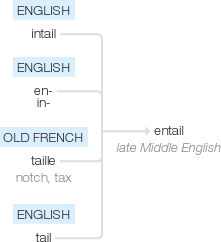Entail
late Middle English (referring to settlement of property; formerly also as intail ): from en-1, in-2 ‘into’ + Old French taille ‘notch, tax’ (see tail2).
wiktionary
From Middle English entaillen, from Old French entaillier, entailler(“to notch”, literally “to cut in”); from prefix en- + tailler(“to cut”), from Late Latin taliare, from Latin talea. Compare late Latin feudum talliatum(“a fee entailed, i.e., curtailed or limited”).
From Middle English entaille(“carving”), from Old French entaille(“ incision”), from the verb entailler. See above.
etymonline
entail (v.)
mid-14c., "convert (an estate) into 'fee tail' (feudum talliatum)," from en- (1) "make" + taile "legal limitation," especially of inheritance, ruling who succeeds in ownership and preventing the property from being sold off, from Anglo-French taile, Old French taillie, past participle of taillier "allot, cut to shape," from Late Latin taliare "to split" (see tailor (n.)). Sense of "have consequences" is 1829, via the notion of "inseparable connection." Related: Entailed; entailling; entailment.
